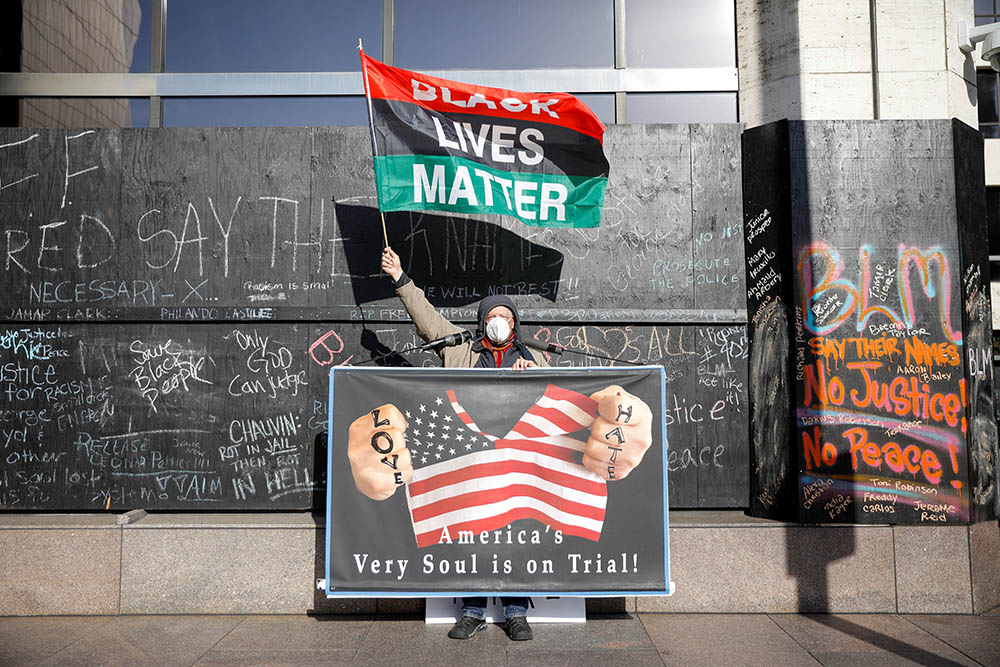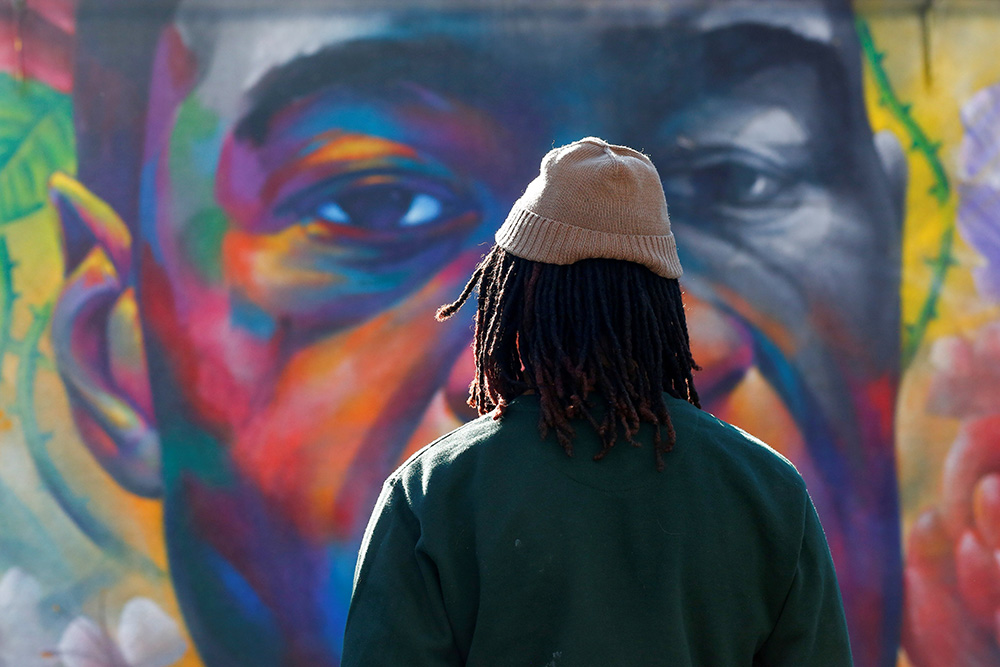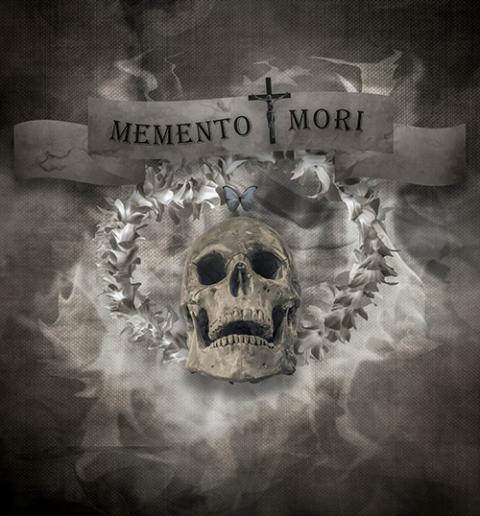
A demonstrator holds a Black Lives Matter flag and another sign April 6 outside the Hennepin County Government Center in Minneapolis on the seventh day of the trial of former police officer Derek Chauvin, who was convicted April 20 of second-degree murder, third-degree murder and second-degree manslaughter in the May 25, 2020, death of George Floyd. (CNS/Reuters/Nicholas Pfosi)

Editor's note: Global Sisters Report's new blog, Monday Starter, is a weekly feature from GSR staff writers that rounds up news from or about women religious that you may otherwise have missed.
The April 20 conviction of former Minneapolis police officer Derek Chauvin in the death of George Floyd prompted numerous statements from U.S. religious communities and conferences, saying justice was served, but the conviction should lead to renewed efforts to combat systematic racism.
In their statements, all of the groups looked beyond the immediate verdict and toward the challenging task ahead.
An April 23 joint statement issued by the National Black Sisters' Conference and the Leadership Conference of Women Religious said the two bodies are recommitting themselves "to working for real and sustained systemic change in the struggle to end institutional racism in every aspect of our society."
"We believe that we are at a crucial moment in race relations in this country. We must acknowledge and work to eradicate the sin of White Privilege that seeks to affirm the false superiority of Anglo-Saxon culture and way of life," the joint statement said.
The Sisters of Bon Secours said in an April 21 statement: "[Even] as we breathe this sigh of relief and welcome this ruling, we acknowledge that the difficult work of dismantling systemic racism is a long, arduous and lifelong commitment. In this pivotal moment in history, we, women of healing, reiterate and reinvigorate our commitment to bring healing to the disease of racism in our own hearts, in our communities, our country and our world."
A joint declaration by the leadership of the Ursuline Sisters of Louisville and the Sisters of Charity of Nazareth, both based in Kentucky, said: "As majority white communities of religious sisters in the United States, we recommit ourselves to prayer, self-examination, and advocacy. We also call for fundamental reform in the way policing is done in the United States."
The April 20 statement added: "We call for and commit to REAL change to bring REAL peace, the peace that comes when each and every human life is treated with respect and every person is recognized and embraced as a precious child of God."
"Justice has been served, " the Adrian Dominican Sisters said in their April 20 statement, adding, "We call on all Americans to join in undoing the perduring racism that for too long has imperiled the lives of our Black brothers and sisters, sickened our souls, and debased our democracy."
Mercy Sr. Mary Haddad, the president and chief executive officer of the Catholic Health Association of the United States, said the verdict "calls us to come together as people of God and renew our commitment to racial and social justice."

A person in Denver is seen at a George Floyd mural April 20 after jurors issued their verdict convicting former Minneapolis police officer Derek Chauvin of second-degree unintentional murder, third-degree murder and second-degree manslaughter in the death of Floyd. (CNS/Reuters/Kevin Mohatt)
Haddad added," As a Catholic health care ministry, we firmly believe that racism is a public health crisis. We are committed to addressing health disparities and achieving health equity."
In its statement, the Sisters, Servants of the Immaculate Heart of Mary of Monroe, Michigan, called the verdict "an important step toward accountability. We pray that it will provide some semblance of justice and wholeness to a grieving community."
However, the statement said, "[We] recognize that the systems that ultimately ended George Floyd's life and countless other Black lives still exist."
The congregation also urged passage of the George Floyd Justice in Policing Act, which would "ban chokeholds, police profiling and no-knock warrants. It would also ensure that officers who break the law can be held accountable and stop the rampant militarization of many police departments."
Also issuing a statement was Network, a Catholic social justice lobby, which was headed by Sr. Simone Campbell for 17 years.
Mary Novak, the organization's new executive director, said that while the April 20 verdict "is a significant step forward for accountability for police brutality, there is still much work to be done."
In urging passage of the George Floyd Justice in Policing Act, the lobbying group said: "All elected officials and each of us must re-examine our federal policies, our economic system, and our society and see where they uphold white supremacy and fail to advance racial equity and equal justice under law."
Advertisement
FSPAs give their staff members a raise
It may not seem like news when a U.S. congregation supports a federally mandated $15-an-hour minimum wage. But the Franciscan Sisters of Perpetual Adoration are backing up that support by raising the wages of its own staff.
The congregation says the move is in appreciation for its workers and places the sisters squarely behind interfaith efforts to raise the minimum wage.
"This isn't just about economic justice," the congregation said in an April 15 statement. "[We] recognize our partners in mission serving on staff are gold. We're advocating for livable wages and we want it to start at home. We're investing in our partners as they help us carry forward our mission."
The congregation says it has partnered with Wipfli Consultants "to begin a compensation project that will ultimately raise the organization's minimum wage to $15 in 2021."
The congregation says its efforts are part of wider work for economic justice, noting its support for a higher minimum wage called for by the Interfaith Center on Corporate Responsibility and the Seventh Generation Interfaith Coalition for Responsible Investment.
The congregation notes, too, that the decision to raise wages "is in line with Pope Francis' Easter message of solidarity with movements that support workers' dignity through changing economic structures, including consideration of a universal basic wage.
A new effort in the meditation of contemplating death
The Daughters of St. Paul are expanding efforts promoting the idea of memento mori, the ancient meditation of contemplating death.

A photo illustration depicting memento mori, a reminder of one's death (CNS/St. Louis Review/Lisa Johnston)
Following the production of several resources on the theme, the congregation plans to release a new book by Sr. Theresa Aletheia Noble, Memento Mori: An Advent Companion on the Last Things, in October for use during Advent.
"Advent means nothing without recognizing that Jesus came to save us from death. Jesus was born to die so that we may live. Remembering this reality in light of our death can change lives," Noble said in a press release announcing the book.
However, since the sisters have experienced a 40% decline in missionary income because of the pandemic, the congregation has launched a Kickstarter campaign to raise money for the project. The congregation is close to its initial goal of $30,000 and hopes to eventually raise a total of $80,000, said Sr. Danielle Victoria Lussier of Pauline Books and Media, which will publish the book.
Pauline Books and Media is a congregational ministry that in addition to publishing runs a dozen bookstores in the United States and Canada.
In announcing the project and the Kickstarter campaign, the congregation noted that Noble has long put a skull on her desk and meditated on death. She has shared her experiences and meditations on social media with the hashtag #mementomori.
Through Pauline Books and Media, the congregation has produced several resources from Noble on the theme of meditating on death, including a prayer book, a journal and a Lenten devotional.







